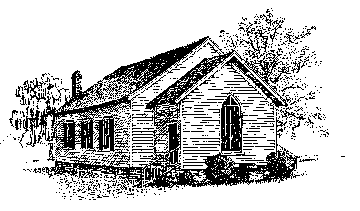In 1740, Richard Whitaker built an Anglican chapel on his property in Halifax County. With the coming of the Revolutionary War, Anglican clergy in the area abandoned the chapel, and the Methodists moved in.
The chapel probably became a preaching point on the North Carolina and Roanoke Circuits. Francis Asbury preached at Whitaker’s Chapel at least three times, in 1786, 1789, and 1804.
By the 1820s, a significant number of laity and clergy were growing increasingly dissatisfied with the power of the bishops and the clergy in the Methodist Episcopal Church. These reformers called for more lay representation in church government (at that time, lay persons were not members of annual or General Conferences and had no voting rights.)
The movement was strong in North Carolina. In the words of historian Ancel Bassett, “the local ministry…were the first to complain of the undue powers of the bishops and itinerant preachers, and to seek for some modification in the government of the church.”
In 1828, several clergy were expelled from the denomination for circulating “incendiary publications.” By this time, the Reformers, as they were called, knew that the time for compromise had passed.
On December 19, 1828, 14 preachers and 12 laymen met at Whitaker’s Chapel and organized what became the North Carolina Annual Conference of the Methodist Protestant Church. This was the first annual conference of the new denomination; two years later the Methodist Protestant Church held its first General Conference.
The North Carolina Conference met at Whitaker’s Chapel five more times, in 1830, 1833, 1842, 1845, and 1849. In 1939, when the Methodist Protestant Church merged with the northern and southern branches of the Methodist Episcopal Church, Whitaker’s Chapel joined the new Methodist Church. Worship services ceased in 1948, and the building fell into disrepair until 1964, when a descendant of Richard Whitaker funded a restoration.
The original chapel was built of logs; at some point it was torn down and replaced with a frame building. In 1850 that structure was moved 500 yards from the site and a new church was erected in its place. The 1850 building was moved across the road to its current location in 1880.
Points of interest at this Heritage Landmark: The church is furnished in mid-nineteenth century style, with kerosene lamps (now electrified) and a pump organ. Some church records and artifacts are on display.
The cemetery behind the church dates from the early nineteenth century and contains the remains of several Civil War soldiers as well as Methodist Protestant preachers and church members.
Parking is available at the church. The grounds have a new picnic shelter which includes a storage closet and a restroom.
Special events: There are two services each year. Homecoming is the second Sunday in June at 11:00am, which is followed by “dinner on the ground.” Secondly, there is a Christmas service the first or second Sunday in December at 3:00 pm. Refreshments are served after the service.
Area attractions: Nearby are the cities of Raleigh and Durham with numerous sites of historical and cultural interest. Green Hill House is a short drive to the southwest.
To visit: Visitors are welcome to attend the services mentioned in the “Special Events” description above. At other times, visits can be arranged by contacting Ann Newbern (see contact info below).
Location: Within the boundaries of the North Carolina Annual Conference in Halifax County, North Carolina. The chapel is six miles east of Enfield on state route 1003.
Food and lodging: Motels and restaurants are located on Interstate 95 in Rocky Mount (eighteen miles south of Enfield) and in Roanoke Rapids (fifteen miles north of Enfield).
Directions: Take Interstate 95 to the Highway 481 East (Enfield) exit and proceed to the stoplight at the intersection of U.S. 301 in Enfield. Continue to go straight at this intersection on rural paved road 1003 (Thirteen Bridges Road) for approximately five and one-half miles. The Chapel in located on the right-hand side of this road.
For further information, contact: Ann Newbern, 252-536-9531; ann.newbern@gmail.com.
To learn more about United Methodist church history in this area:
North Carolina Annual Conference Archives, 700 Waterfield Ridge Place, Garner, NC 27529; 919-779-6115; Bill Simpson, Historian.
Lyman E. Davis, Democratic Methodism in America; A Topical Survey of the Methodist Protestant Church (New York: Fleming H. Revell, 1921).
Paul S. Kennett, The Methodist Protestant Church in North Carolina (s.l.: s.n., 1927?).

